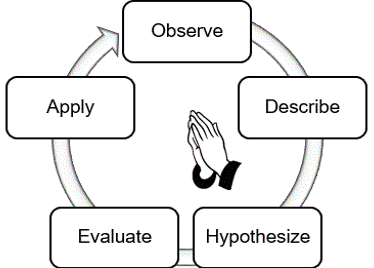What is Participant Observation?
- Approximate Time Commitment: 10 minutes
When immersing yourself into a new culture, the best way to learn about that culture is through participant observation. This resource focuses specifically on how to do this effectively. There are five main parts of the observation life-cycle: Observe, Describe, Hypothesize, Evaluate, and Apply. This resource is good for people who are planning to jump into the missionary field.
Resource Description
Full Resource:
Missionaries Mike and Michelle had been in country for six months. At first everything was exciting! The food, the music, and the celebrations were all so interesting. They were welcomed enthusiastically by their teammates and the nationals alike. They know they are in the right place and are anxious for their language skills to catch up to the desire that they have to share the gospel with neighbors.
However, lately things have become so confusing. They can’t figure out the public transportation system, they don’t know what the social cues mean, and even the simple greetings they have learned have led to embarrassing offenses. How can Mike and Michelle make sense out of the confusion?
An ethnography is an in-depth, descriptive study of a culture, based on observation of and interaction with people. This may be done through reading academic research on the culture (literature review), or by asking questions about culture (interviews). But probably the best way to understand a new culture is through what is called “participant observation.” This is a technique used in anthropology and sociology, by which someone from outside the culture (a participant observer) studies the life of a group by sharing in its activities. It involves learning from people, finding out what makes them tick, expressing interest in the things that are important to them, and inviting them to teach you to see the world from their point of view.
Key Concepts
1. Intentionality: Human nature may tend to be passive and even inattentive in a new situation. But in doing participant observation, we will be disciplining ourselves to pay attention and to record our observations in order to think about what it means.
2. Withholding judgement: The common tendency is to interpret and evaluate behaviors too quickly. Without sufficient information, those new to a culture will draw conclusions based on their previous culture. The Ethnographic Research Cycle (below) involves observing, describing, hypothesizing, evaluating, applying and observing again toward an ever deepening understanding of the culture.
I had made many trips to Southeast Asia to train pastors. On this trip the training seemed to be going especially well. Then, while walking in the local market with the students, Pastor Tran took my hand. I thought he merely wanted my attention and motioned for the translator. But I was wrong. Tran wanted to walk hand in hand through the market with me. Based on my expectations and previous cultural experience, this made me uncomfortable. But I withheld judgment and later found out that this was a very kind gesture and perfectly normal for heterosexual men.
3. Seeking insiders’ perspective: The goal is to get an insider’s point of view. We do this through participant observation as well as friendly conversations. This means you need to listen to the right people – the insiders, not necessarily the Christians or the other expatriates.
Ethnographic Research Cycle

- Observe: Make observations of the place, activities, and actors in a given social situation. A good observer notices artifacts present in social situations, how space and time are utilized, and the use of language and other means of communication. Remember that observation is not limited to the perception of material things alone; we also perceive behavior and attitudes, emotions, non-verbals, etc. Doing this effectively requires relating to cultural helpers and asking appropriate questions.
- Describe: Record your observations during and immediately after a significant event. You may need to have a good memory as in many situations it is not possible to take notes at the time. If it is culturally appropriate, keep a notepad and/or electronic device with you at all times so that you can capture your observations in real time when possible. Expand your notes as soon as you are able and be sure to distinguish your observations from your interpretations.
Remember you want to withhold judgement and describe things as objectively as you can. For example: “The man is angry” is judgmental for a participant observer. “That man is talking loudly” is appropriate. Likewise, “the woman is not friendly” would be better said as “the woman does not speak as often as others.”
- Hypothesize: A hypothesis is an educated guess about the significance of what you have observed. This may be developed by asking questions such as: “What does this mean to them?” or “What does this show about their culture?” The goal is to make sense of the event from their point of view. Your hypothesis may be in error, so hold it lightly and continue moving toward understanding.
- Evaluate: You should evaluate your hypothesis for accuracy by additional observation, interviews, and by sharing your hypothesis with others.
- Apply: Once a hypothesis has been evaluated and confirmed to be accurate, use the new information for appropriate social interactions and relationship building and to form an action plan for spreading the Gospel. Remember, it is not sufficient to simply understand a culture – you need to become part of it to have an impact.
- …Observe: Use the same or similar events to confirm, correct, or go deeper concerning what you have learned.
Conclusion
In all likelihood, you are participating in your new culture all the time – at the market, at the park, with neighbors, in worship. You are participating, but now you know how to observe and benefit from your observations.
Only logged in customers who have purchased this product may leave a review.



Reviews
There are no reviews yet.